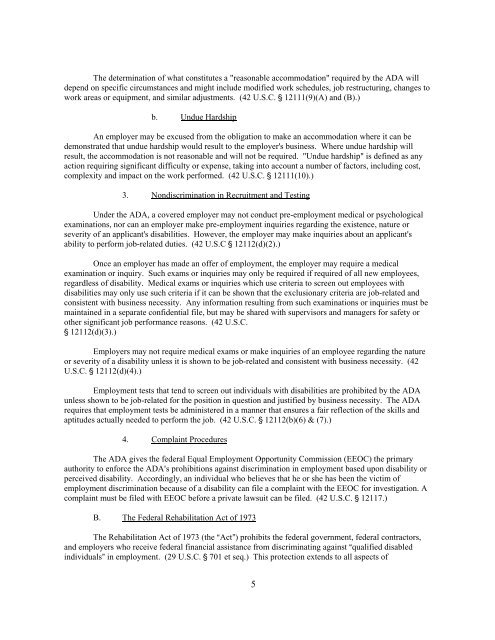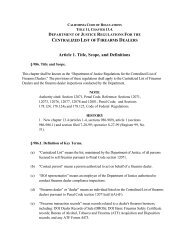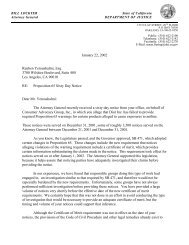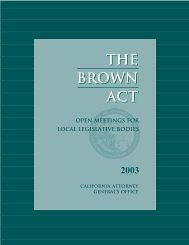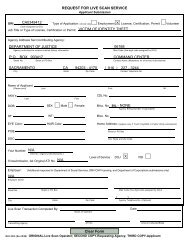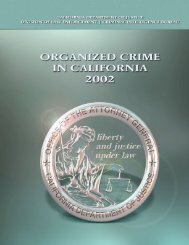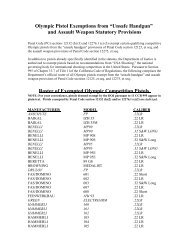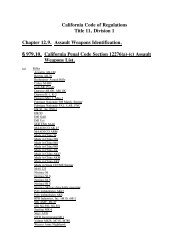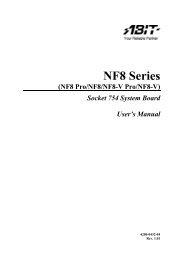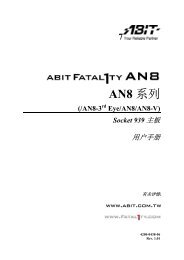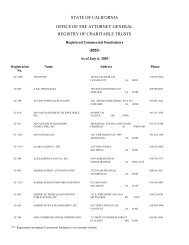Legal Rights of Persons With Disabilities - Ossh.com
Legal Rights of Persons With Disabilities - Ossh.com
Legal Rights of Persons With Disabilities - Ossh.com
You also want an ePaper? Increase the reach of your titles
YUMPU automatically turns print PDFs into web optimized ePapers that Google loves.
The determination <strong>of</strong> what constitutes a "reasonable ac<strong>com</strong>modation" required by the ADA will<br />
depend on specific circumstances and might include modified work schedules, job restructuring, changes to<br />
work areas or equipment, and similar adjustments. (42 U.S.C. ' 12111(9)(A) and (B).)<br />
b. Undue Hardship<br />
An employer may be excused from the obligation to make an ac<strong>com</strong>modation where it can be<br />
demonstrated that undue hardship would result to the employer's business. Where undue hardship will<br />
result, the ac<strong>com</strong>modation is not reasonable and will not be required. "Undue hardship" is defined as any<br />
action requiring significant difficulty or expense, taking into account a number <strong>of</strong> factors, including cost,<br />
<strong>com</strong>plexity and impact on the work performed. (42 U.S.C. ' 12111(10).)<br />
3. Nondiscrimination in Recruitment and Testing<br />
Under the ADA, a covered employer may not conduct pre-employment medical or psychological<br />
examinations, nor can an employer make pre-employment inquiries regarding the existence, nature or<br />
severity <strong>of</strong> an applicant's disabilities. However, the employer may make inquiries about an applicant's<br />
ability to perform job-related duties. (42 U.S.C ' 12112(d)(2).)<br />
Once an employer has made an <strong>of</strong>fer <strong>of</strong> employment, the employer may require a medical<br />
examination or inquiry. Such exams or inquiries may only be required if required <strong>of</strong> all new employees,<br />
regardless <strong>of</strong> disability. Medical exams or inquiries which use criteria to screen out employees with<br />
disabilities may only use such criteria if it can be shown that the exclusionary criteria are job-related and<br />
consistent with business necessity. Any information resulting from such examinations or inquiries must be<br />
maintained in a separate confidential file, but may be shared with supervisors and managers for safety or<br />
other significant job performance reasons. (42 U.S.C.<br />
' 12112(d)(3).)<br />
Employers may not require medical exams or make inquiries <strong>of</strong> an employee regarding the nature<br />
or severity <strong>of</strong> a disability unless it is shown to be job-related and consistent with business necessity. (42<br />
U.S.C. ' 12112(d)(4).)<br />
Employment tests that tend to screen out individuals with disabilities are prohibited by the ADA<br />
unless shown to be job-related for the position in question and justified by business necessity. The ADA<br />
requires that employment tests be administered in a manner that ensures a fair reflection <strong>of</strong> the skills and<br />
aptitudes actually needed to perform the job. (42 U.S.C. ' 12112(b)(6) & (7).)<br />
4. Complaint Procedures<br />
The ADA gives the federal Equal Employment Opportunity Commission (EEOC) the primary<br />
authority to enforce the ADA=s prohibitions against discrimination in employment based upon disability or<br />
perceived disability. Accordingly, an individual who believes that he or she has been the victim <strong>of</strong><br />
employment discrimination because <strong>of</strong> a disability can file a <strong>com</strong>plaint with the EEOC for investigation. A<br />
<strong>com</strong>plaint must be filed with EEOC before a private lawsuit can be filed. (42 U.S.C. ' 12117.)<br />
B. The Federal Rehabilitation Act <strong>of</strong> 1973<br />
The Rehabilitation Act <strong>of</strong> 1973 (the AAct@) prohibits the federal government, federal contractors,<br />
and employers who receive federal financial assistance from discriminating against Aqualified disabled<br />
individuals@ in employment. (29 U.S.C. ' 701 et seq.) This protection extends to all aspects <strong>of</strong><br />
5


